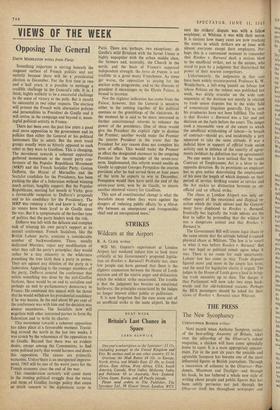VIEWS OF THE WEEK
Opposing The General
DREW MIDDLETON writes from Paris: Something important is stirring beneath the stagnant surface of .French politics and not entirely because there will be a presidential election in December. For the first time in two and a half years, it is possible to envisage a credible challenge to the General's rule. It is, I think, highly unlikely to be a successful challenge in the sense of victory at the polls. But it should be successful in two other respects. The election will present the French with alternative policies and personalities to President de Gaulle and it will revive, in the campaign and beyond it, mean- ingful political activity in France.
There has been over the past few years a good deal more opposition to the government and its policies than either the General or his political lieutenants like to admit. But the most vocal groups usually were as bitterly opposed to each other as they were to Gaullism. This is changing. The movement towards a coherent opposition gathered momentum at the recent party con- ferences of the Popular Republican Movement (MRP) and the French Socialist Party. Gaston Defferre, the Mayor of Marseilles and the Socialist candidate for the Presidency, has been pushing the idea of a federation without winning much serious, tangible support. But the Popular Republicans, meeting last month at Vichy, gave a favourable reception to Defferre's proposals and to his candidacy for the Presidency. The MRP Was running a risk and knew it. Many of its voters have been loyal to de Gaulle since the war. But it is symptomatic of the harsher tone of politics that the party leaders took the risk.
Defferre was left with the delicate and complex task of winning his own party's support at its annual conference. French Socialism, like the British Labour party, contains a considerable number of backwoodsmen. These, usually dedicated Marxists, reject any modification of what they call the party's principles; they would rather be a tiny minority in the wilderness preaching the true faith than a party in power. They are against any dilution of the party in a federation. Appealing to the younger members of the party, Defferre assured the conference that unless something was done by the anti-Gaullist factions, there would be an end to socialism and perhaps an end to parliamentary democracy in France. He combined this appeal with the threat that he would withdraw his presidential candidacy if he was beaten. In the end about 80 per cent of the conference was with him and the decision was almost unanimous. The Socialists now will negotiate with other interested parties to form the federation and to write its charter.
This movement towards a coherent opposition has taken place at a favourable moment. Travel- ling around the north in the last two weeks, I was struck by the vehemence of the opposition to de Gaulle. Beyond that there was an evident desire, except among the Communists, to find some political party that would harness and direct this opposition. The causes are primarily economic. Unless there is an unexpected improve- ment, 1965 will be one of the worst years for the French economy since the end of the war.
This consideration certainly will count more in the doming political struggle than the twists and turns of Gaullist foreign policy that cause so much concern to the diplomatic corps in Paris. There are, perhaps, two exceptions: de Gaulle's mild flirtation with the Soviet Union is highly unpopular with the urban middle class, the farmers and, naturally, the Church in the north; and the basis of France's supposed independent strength, the force de frappe, is not credible to a great many Frenchmen. As times get worse, the opposition to paying tor the nuclear arms programme, and to the illusions of grandeur it encourages in the Elysee Palace, is bound to increase.
Not the slightest indication has come from the Palace, however, that the General is sensitive either to the coming together of his political enemies or the grumblings of the electorate. At the moment he is said to be more interested in further constitutional reforms to enhance the power of the presidency. One of these would give the President the explicit right to dismiss the Premier; another would make the Premier the interim President in the event that the President for any reason does not complete his term of office. This would make the Premier in effect the designated successor to the outgoing President for the remainder of the seven-year term. Implemented, this reform would enable de Gaulle to appoint Georges Pompidou the interim president after he had served three or four years of the term he expects to win in December. Pompidou would then have until the end of the seven-year term, won by de Gaulle, to ensure another electoral victory for Gaullism.
This sort of constitutional change is what the Socialists mean when they warn against the dangers of reducing public affairs `to a tete-a- tete between an omnipotent and irresponsible chief and an unorganised mass.'


































 Previous page
Previous page